- ai in law
- legal tech
- artificial intelligence
AI in Legal Profession
Aug 11, 2025
-
Emilia Skonieczna
-
11 minutes
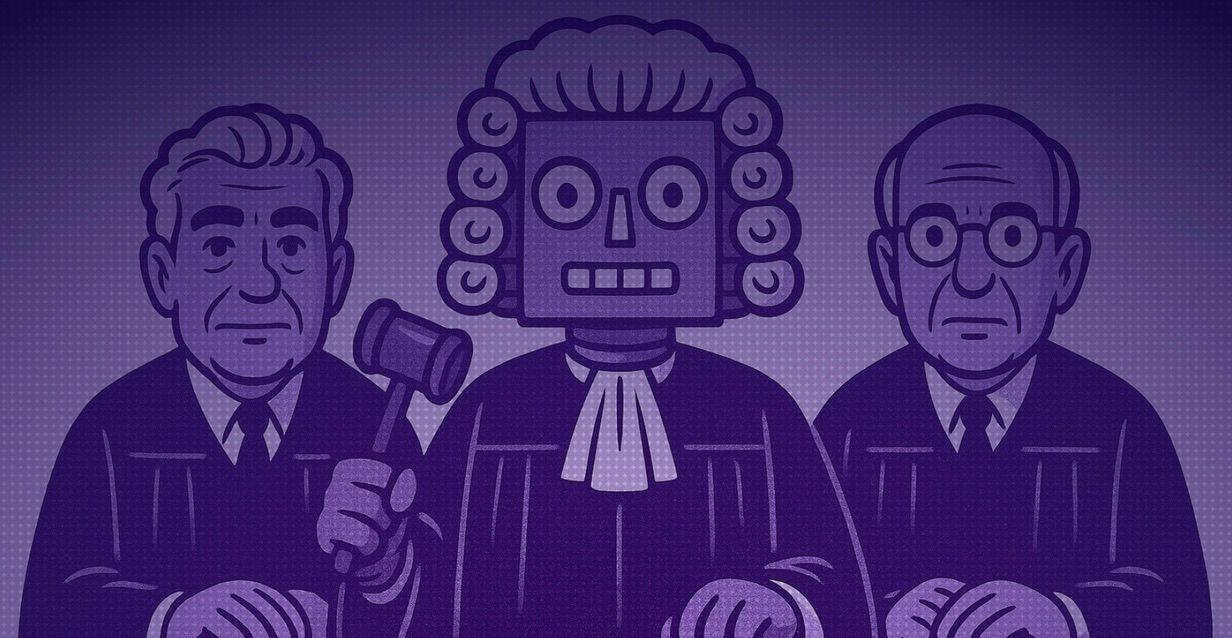
When people talk about AI revolutionizing industries, they usually think about robots in factories or recommendation systems that help them choose their next Netflix movie. But that's just the beginning. Real change is happening in a profession defined by tradition where rules rule everything: law.
From classic courtroom scenes to rows of old law books steeped in history, the legal world has always been rooted in tradition. But today, something no one expected is changing that world. Not new laws, but new technology. AI is becoming a key partner in legal work.
The era of endless paperwork is fading. AI tools can now analyze contracts in seconds, predict case outcomes and identify potential risks before they arise.
But what does this mean for the future of the legal industry?
Is artificial intelligence a helpful assistant, or a disruptive force poised to challenge the very foundations of the legal world?
Most industries can rely on general AI tools, but the legal field is different. It requires highly specialized solutions tailored to unique language, logic, and risk. Here are a few of the tools that are changing how legal professionals work:
Document Review and Contract Analysis - advanced legal technologies use natural language processing (NLP) to quickly scan, summarize and identify key clauses in contracts; what used to take days now takes minutes;
Legal Research with NLP - certain platforms allow lawyers to ask questions and instantly receive relevant case law, statutes, and interpretations; this not only saves hours of searching through databases but also helps minimize the risk of missing important precedents;
Predictive Analytics - some systems can analyze previous court rulings, judge behavior, and opposing counsel's track records to predict case outcomes; these insights help shape litigation strategies, assess risk and determine whether to settle or proceed to trial;
Electronic Discovery - reviewing large volumes of emails and documents used to be daunting during litigation; but now, e-discovery tools can detect patterns, prioritize relevant documents, support due diligence and flag issues;
Drafting and Clause Suggestions - instead of starting from scratch, attorneys can use tools that suggest relevant clauses, detect inconsistencies and ensure compliance with legal language;
Chatbots and Virtual Assistants - bots are helping people access basic legal information without even contacting a lawyer;
These tools can be really useful - they may save time, increase efficiency, reduce the risk of missing key precedents, and even provide basic legal information without the need to contact an attorney. They can do even more than that, but it's important to remember that at the end of the day, it's still just a machine - it doesn't think like a human, so in many cases human oversight is necessary.
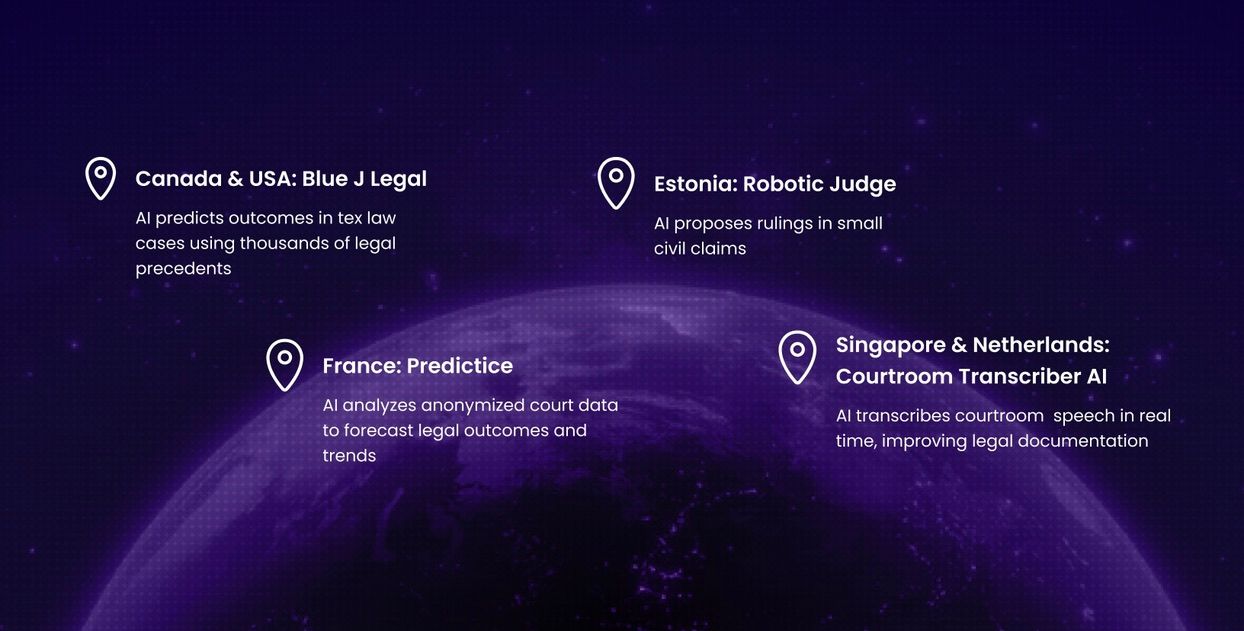
Legal note (France): AI tools cannot predict individual judges' rulings; Predictice uses anonymized data in line with national law. Read More
For most people, legal research has always been a time-consuming tedious part of their job. But now, artificial intelligence is turning that process on its head. Instead of sifting through mountains of case law, statutes and interpretations, lawyers can simply ask a question and let AI tools do the hard work. These platforms, based on NLP, quickly bring up the most relevant rulings, legal arguments and precedents - saving hours or even days of work.
But it's not just about saving time. Advanced technology minimizes the risk of human error and oversight, which can be critical in high-stakes cases. It doesn't replace legal reasoning, deep understanding of the law, or a lawyer's judgement, but imagine someone who never sleeps, never complains, and somehow reads faster than anyone in the room. That's what it's like. For lawyers, this means more time to focus on strategy, argumentation and what really matters: winning the case.
But here's the catch - AI doesn't always get it right. In the UK, a group of lawyers landed in trouble after using fake cases generated by AI. A judge made it clear: relying on unchecked AI results could lead to real consequences. Read More
The goal of artificial intelligence is not to replace attorneys, but to make their work smarter, faster and less repetitive. The idea is simple - to take the boring parts out of their job. With smart tools doing the hard, time consuming work, firms can focus more on strategy and less on paperwork.
It's not a secret that customer expectations have changed. They want quick answers, clear communication and transparency - without having to chase someone. Tools like chatbots and virtual assistants, are filling these gaps. They can handle FAQs, collect information about a case, and even guide clients through basic legal processes - day or night.
For law firms, this means better client satisfaction without burning out employees with repetitive tasks. It's not about replacing personal contact, it's about giving lawyers more time to focus on delivering better service when it really matters. In the end, AI helps firms to be more responsive, more available, and just... easier to work with.
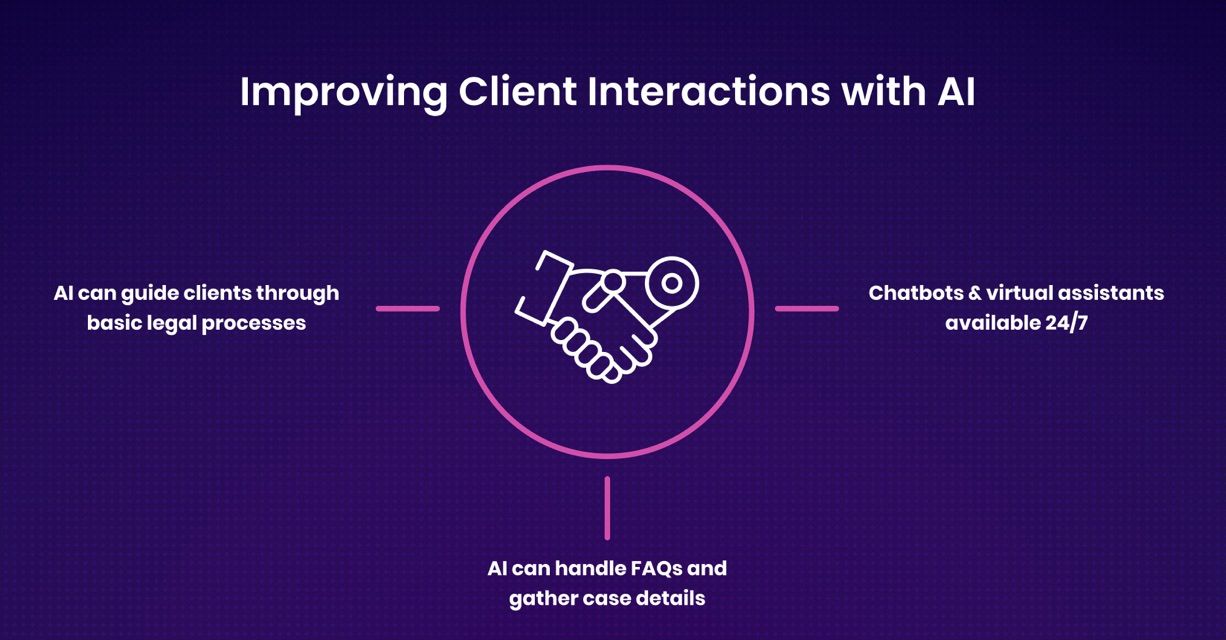
If there’s one thing AI does well, it’s the repetitive, detailed world of contracts. Natural language processing tools can now review, summarize, and even flag potential issues in a fraction of the time it would take a human. Need to write something from scratch? AI can suggest relevant clauses, ensure consistency, and check compliance with current legal standards.
Instead of spending hours refining templates, attorneys can focus on the things that actually require their expertise.
The result: faster turnaround, fewer errors, and significantly less time spent staring at paragraphs of legal jargon.
Let’s be honest, not every part of legal work is exciting. Reviewing documents, digging through research, scheduling meetings… it’s the kind of stuff that eats up hours and drains energy. That’s where AI can actually help. It takes care of the routine tasks, so you can focus on the work that really matters - the stuff that needs your brain, not just your time. With the right tools, teams can move faster, avoid delays, and use their time and talent more efficiently.
It all comes down to this:
It’s not about doing more work - it’s about doing the right work. And that’s better for everyone.
Artificial Intelligence is powerful, but with great power comes... complications? Not exactly, but there are real ethical concerns. In a field built on trust, confidentiality, and fairness, the introduction of machine driven tools raises important questions:
Who's responsible when AI gets it wrong?
Can algorithms truly be unbiased?
What about all that sensitive data being fed into systems?
As AI becomes more embedded in legal practice, making sure it's used responsibly isn't just smart - it's a necessity.
Law firms manage some of the most sensitive information - client records, contracts, litigation details. When AI tools enter the mix, protecting that data becomes even more critical. Which brings up questions like: If a system pulls data from various sources, where is that information stored? Who has access? Can it be hacked?
Adopting these technologies requires more than simply accepting terms and conditions. Firms need to ensure make sure that their tools follow strict data security standards, are fully compliant with privacy regulations, and don't put clients at unnecessary risk. Without proper precautions, the benefits of automation could result in significant legal consequences - including potential lawsuits.
AI isn't as bad as people think - but it's not automatically ethical either. Just because a tool makes work faster doesn't mean it's being used responsibly.
Are clients being informed when AI is involved in their casework? Transparency is essential to maintaining trust. Are firms reviewing the output, or just accepting it at face value? Ethical use means applying such solutions as a helper, not a decision maker, while maintaining human judgement and accountability. Lawyers must stay curious, question the results, and put integrity first.
After all, efficiency should never come at the cost of professional standards or client trust.
AI is only as fair as the data we feed it, and let's be honest, legal data carries a lot of baggage. Decades of systematic bias don't just disappear when we plug them into machine. In fact, if we're not paying attention, that bias gets baked into the software and scaled. Imagine an AI that learns how to sentence people based on flawed rulings from the past. Suddenly, injustice isn't just repeated - it's automated. That's not innovation. That's dangerous.
Fairness in legal tech isn't just a nice-to-have. It's the baseline. Developers, lawyers, and everyone in between need to audit what these models learn, question the assumptions behind the code, and build systems that don't just echo history - but actively work to correct it. The law should be fair - and so should the tech that supports it.
Let's think about what's really changing.
Long hours, turning pages, endless checking. Now imagine it can be done in minutes, with even better accuracy. What used to require a team of lawyers can now be done by intelligent systems that adapt and improve.
This isn't the future - it's happening now. The legal industry doesn't have to chase innovation, but it does have to keep up with it. Because the way we work is changing fast - and that's just the beginning.
Legal services are entering a new era. We're moving from simple task automation to more predictive, strategic solutions. This may lead to the advancement of litigation analytics, compliance monitoring, and risk forecasting. As data becomes increasingly important, law firms are turning to advanced tools not only to improve efficiency, but also to gain deeper insights into trends, risks, and outcomes.
Those who stay ahead of the competition will shape the next phase of transformation.
Generative systems are opening new doors for legal profession - drafting clauses, summarizing rulings, creating legal briefs and even generating arguments based on precedents. This means less time on basics and more time for strategy. But the impact of these tools goes further, they are changing the way legal knowledge is created, shared and accessed. Used wisely, they increase transparency, creativity and efficiency - without replacing human judgement where it matters most.
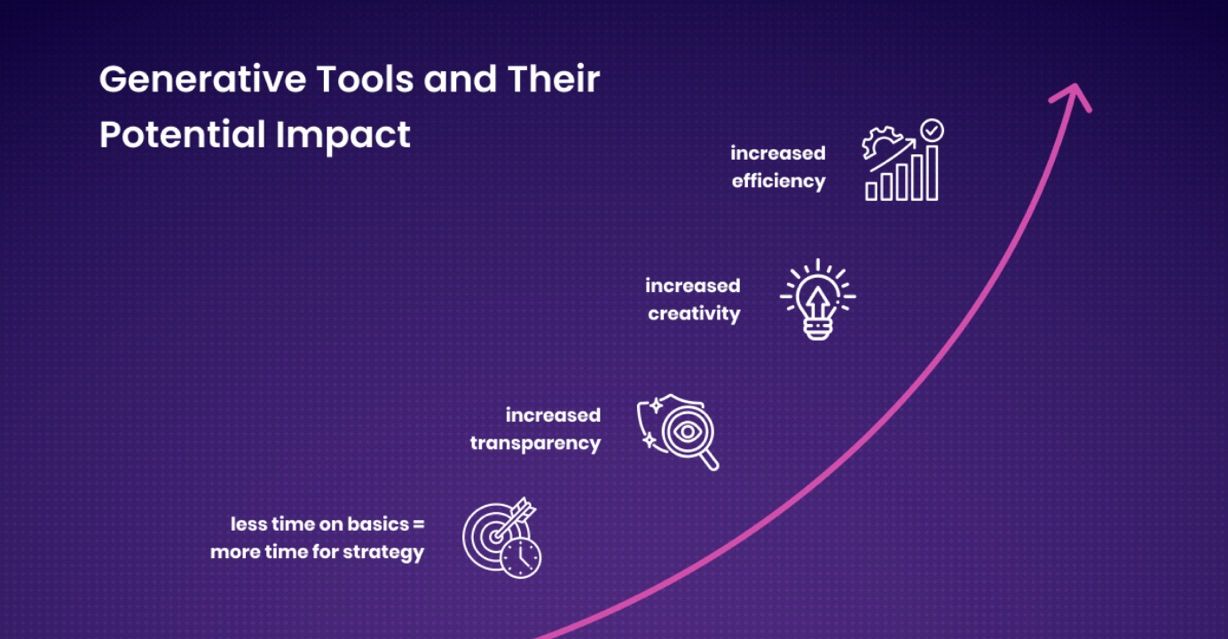
Legal tech isn't slowing down - it's speeding up. This means more than just upgrading tools. It's about embracing a new way of thinking. It's less about what you know, and more about being open to what you don't - new tools, new ideas, and solutions you haven't even imagined yet.
Keep in mind, customer expectations are changing. They want it fast, they want it smart, and they want it real.
In the end, it's not just about having the right tech - it's about having the right mindset.
A great example of technological innovation in the legal field recently took place in Florida, where, for the first time, a judge used a virtual reality (VR) headset in court to assess a self-defense claim from the defendant's perspective.
Instead of relying solely on verbal descriptions or static evidence, the court engaged in a fully immersive VR simulation built by the defense team. Using the Oculus Quest 2 headset, the judge was able to ,,step into" the scene of the incident, offering a new level of empathy and contextual understanding.
This could really change how the legal system works. VR technology has the potential to make legal proceedings more human-centered by fostering deeper emotional and situational understanding. Source
But this case raises important questions:
Could VR become a standard tool in courtrooms around the world?
Is it a smart move, or just another way to manipulate things?
The aim of AI in law is not to replace lawyers - it's to support them. Knowledge can be built into the model, but experience can't. Judgment, nuance, ethics aren't AI's strengths. That's why the human element isn't optional, it's necessary.
Never forget - people's lives may depend on your judgment. It's your call, your client, your consequences - not AI's. So think twice before you trust it blindly.
AI helps - but thinking is still on you.
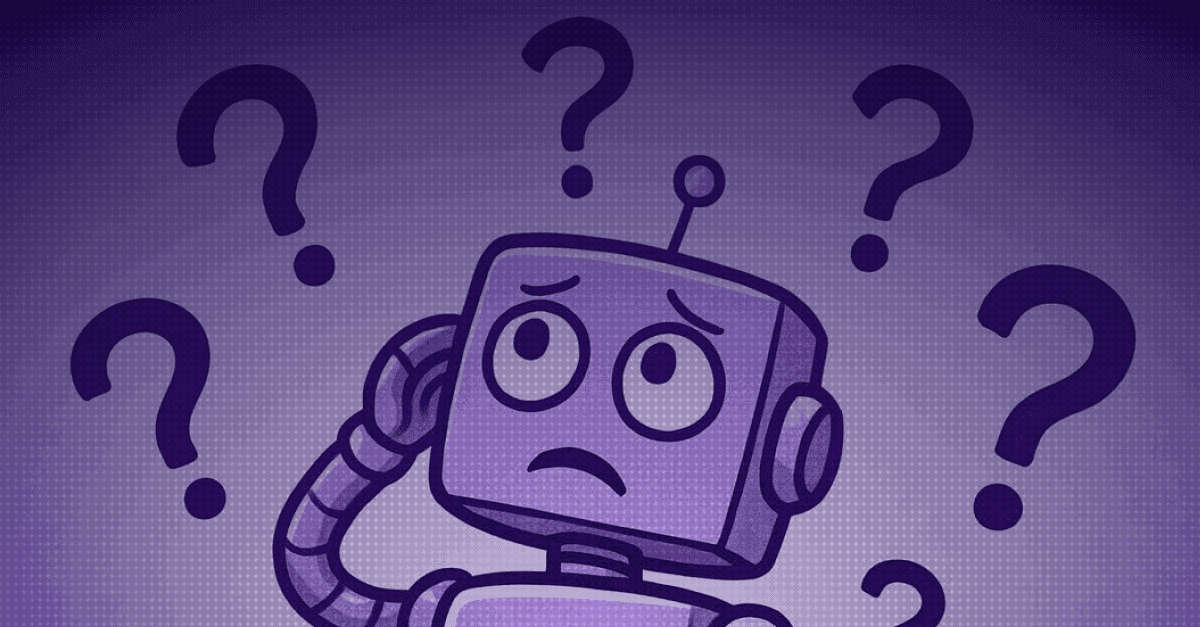
AI is powerful, but not perfect. Discover the key weaknesses it still hasn’t overcome.

AI is changing our daily life, faster than we ever imagined. As it gets more powerful, it’s worth asking: has AI already changed the world more than we realize?

Most SaaS cloud problems start with early decisions. Cloud consulting helps you scale safely, control costs, and build resilient infrastructure from day one.